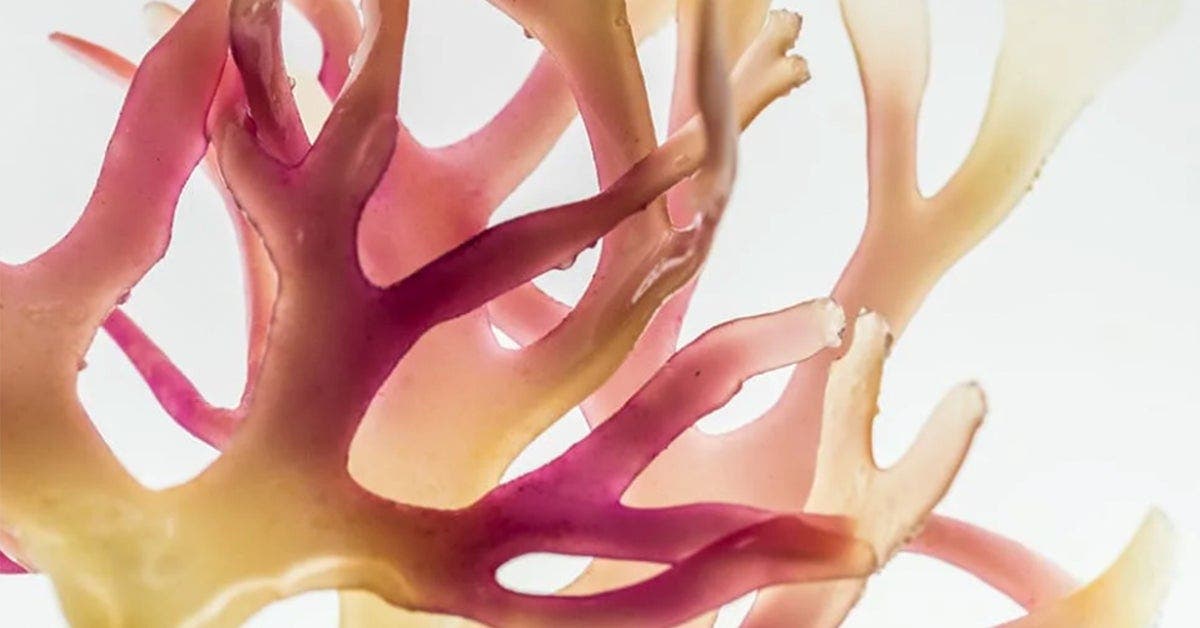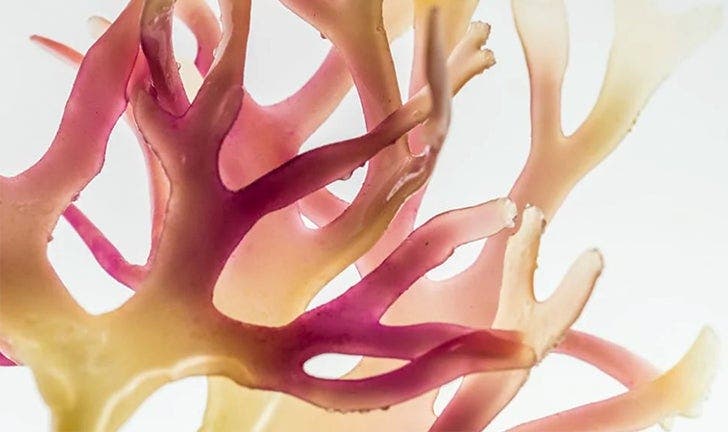Sea Moss: Should You Believe the Buzz?


Look out, wild salmon; a trendy oceanic wonder is coming to steal your spotlight. Sea moss is having a moment right now, with fans touting the red-hued macroalgae as a superfood that can fire up multiple aspects of health. And if you’re among the millions of folks now venturing into plant-based eating, sea moss may seem like a natural next step in amping up your nutrient intake.
According to the buzz on social media, sea moss supposedly can bring down inflammation, help you lose weight, boost thyroid function, smooth out skin wrinkles, optimize digestion, and more. But does the science stack up to the hashtag-driven hype? Let’s take a closer look at the nutritional makeup of sea moss—and the plant’s potential pros and cons—below.
What is sea moss?
This frilly variety of seaweed, also known as Irish sea moss, carrageen, or Chondrus crispus (its scientific name), has long been commercially harvested for its carrageenan, an additive used to thicken and preserve foods. You may have eaten carrageenan derived from sea moss without realizing it—the ingredient is regularly used in ice creams and nondairy milks, as well as some medications.
In recent months, though, the entire plant has been attracting attention. You can now buy dried sea moss whole, or ground up in capsule form. Scoopable sea moss powder is a popular seller, too, as is the gel form of sea moss—fans stir these dietary supplements into drinks, soups, grain bowls, and more. You may have noticed wellness influencers on your social channels claiming they’ve never felt or looked better, all thanks to their daily dose from the sea.
People of different cultures have eaten various forms of red seaweed for thousands of years, including during Ireland’s Great Famine. But as to whether a daily sea moss supplement could improve your health—that may be up for debate.
Is sea moss good for you?
Sea moss does contain small amounts of some nutrients, including calcium, magnesium, fibre, potassium, and others. But there’s scant evidence connecting the plant’s nutrition facts with the flashy health perks being touted by some fans and purveyors.
“The research on sea moss is emerging,” says Ginger Hultin, MS, RDN, a Seattle-based registered dietitian nutritionist and author of Anti-Inflammatory Diet Meal Prep and How to Eat to Beat Disease Cookbook. “For specific health conditions, many of the studies [have been] in a lab, in animals, or on only a small number of people, so there's a lot more that we need to learn over time with more research.”
As with all dietary supplements, the U.S. Food and Drug Administration doesn’t evaluate sea moss products for safety, potency, or efficacy before they hit the market, so it’s tough to know exactly what you’re getting. And most sea moss products aren’t cheap: A bottle of capsules can run you 40 bucks. Before you jump on this aquatic bandwagon, let’s dive a little deeper on the health claims.
Claim 1: Reduces inflammation
Red seaweeds contain antioxidants, substances that inhibit cell damage and may help prevent certain inflammatory diseases. That said, a lot of foods contain these substances. The key antioxidant in sea moss, beta-carotene, is found just as readily in green, orange, and yellow fruits and veggies, including spinach, mangoes, and carrots. And even if sea moss does boast some anti-inflammatory properties, the plant definitely isn’t a cure-all. “One food alone won't be enough to reduce inflammation; it needs to be part of an anti-inflammatory diet,” Hultin says.
Claim 2: Improves gut health
It’s possible—but not proven—that consuming sea moss could support gut health, says Amy Gorin, MS, RDN, a registered dietitian in Stamford, Connecticut, and owner of Plant-Based Eats. So far, scientists have observed that the plant fibres in sea moss can act as prebiotics in humans, aka food for the healthy bacteria that live in the gut. Still, it’s too soon to say what benefits this might bring. In one animal study, rats that ate a diet containing sea moss saw a rise in beneficial gut bacteria (like B. breve) and a decline in potentially harmful bacteria (like C. septicum). Future studies would have to explore whether people experience similar effects and what the broader health impacts might be.
Claim 3: Speeds weight loss
Any promises that sea moss will melt pounds are scientifically unsubstantiated, Gorin says. While it’s true that test-tube studies of various seaweed compounds have concluded that some may inhibit fat cell growth and deprive fat cells of energy, no studies have demonstrated a weight-loss effect in humans who are taking sea moss. Gorin grants that sea moss does contain fibre, which could make your morning oatmeal a bit more satisfying; just know that no single food or supplement has the power to dictate the number on the scale.
Claim 4: Curtails colds
Could a steaming cup of red-seaweed tea cure your seasonal sniffles? While some fans swear by sea moss’s ability to soothe a cough and clear congestion, the science isn’t quite there yet. The notion may have taken root when a small study of 211 cold sufferers found that an experimental nasal spray made with carrageenan was associated with speedier relief from symptoms compared with a placebo spray. (Carrageenan may bind to cold viruses and curb proliferation in the body’s cells.) At this point, there’s no evidence that taking sea moss orally can speed healing.
Claim 5: Can help you conceive
The WW Science Team found no credible evidence that consuming sea moss can increase a person’s chances of getting pregnant. The claim likely springs from the fact that sea moss contains nutrients like zinc and folate, which may support fertility when consumed in adequate amounts. Problem is, sea moss doesn’t deliver much of either—2 Tbsp of the marine plant contains just 18.2 mcg of folate, far short of the 400 mcg RDA recommended for non-pregnant adults, and only trace amounts of zinc.
Claim 6: Boosts thyroid function
Iodine is a nutrient that helps your body make thyroid hormones, which play a key role in metabolism, heart rate, and many other physiological processes. And you’ll find plenty of iodine in sea moss: One study found that each ounce contains around 47 mcg of iodine, 31% of the 150 mcg recommended per day for adults who are not pregnant or nursing. That said, most adults in the U.S. already consume adequate iodine through foods like dairy products, fish, and iodized table salt. Also important to note: Too much iodine can harm health, a risk we’ll discuss more in a sec.
Claim 7: Makes skin and hair healthier
Sea moss as a beauty booster? Maybe—in topical form, anyway. Sea moss and its derivatives are popping up in more and more skin potions and hair products, buoyed by preliminary research hinting at potential cosmetic perks. For example, when applied topically, red seaweeds may have an antimicrobial effect that reduces acne, while compounds derived from the plants may have a smoothing effect on skin. Still, more studies are needed, and the existing research doesn’t pertain to food or supplement forms of sea moss.
Is sea moss safe to consume?
Sea moss supplements may not be safe for everyone, Hultin says. One major concern to keep in mind if you are consuming sea moss—or any seaweed product—is getting too much iodine, she says. Excess iodine consumption can result in thyroid dysfunction in some populations, including thyroiditis, thyroid papillary cancer, and goiter. The National Institutes of Health set the upper intake limit at 1,100 mcg of iodine per day, with a recommendation to stay as close as possible to the RDA of 150 mcg per day. The exact amount of iodine in sea moss products varies by brand, but it’s not unusual for a single serving or dose to contain 300% or more of your daily requirement.
Apart from iodine, seaweed products may contain heavy metals like cadmium, mercury, arsenic, and/or lead, potentially toxic elements that build up in aquatic environments through industrial pollution. One large study of edible seaweed harvested throughout Malaysia found concerning levels of multiple metals across samples. While levels vary depending on a plant’s exact growing environment, researchers, in this case, concluded that consuming such seaweeds daily could increase one’s risk of developing cancer, cognitive impairments, and other health issues.
Bottom line: Sea moss requires further study
Despite the social-media hype surrounding sea moss, science is still taking shape on whether this marine supplement delivers on popular wellness claims—and whether it’s safe to use long-term. Could sea moss help support the health of your gut and thyroid? Maybe. Might sea moss also raise the risk of developing certain diseases over time? That’s a possibility, too. Given these uncertainties, be sure to check in with your doctor if you are thinking about trying a sea moss supplement.
--
Liz Krieger is a freelance writer and editor in Brooklyn, New York.
--
This article was reviewed for accuracy in August 2021 by WW Nutrition Manager Angela Goscilo, MS, RD, CDN. The WW Science Team is a dedicated group of experts who ensure all our solutions are rooted in the best possible research.
